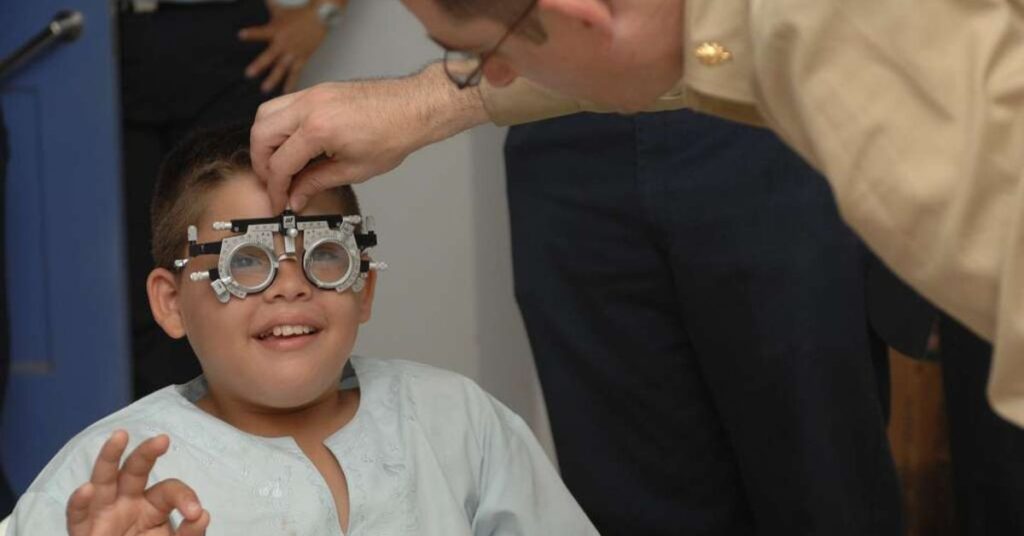Good vision is essential for a child’s overall development—physically, socially, and academically. However, many vision issues in children go unnoticed because kids may not realize or express that they can’t see clearly. Early eye exams are crucial for detecting and correcting vision problems before they interfere with learning and development. Knowing the right age to begin regular eye exams can set the foundation for a lifetime of healthy eyesight.
Importance of Early Eye Tests in Children
Eye exams at an early age help:
- Detect vision issues like nearsightedness, farsightedness, and astigmatism
- Identify eye diseases or misalignment early
- Ensure normal visual development
- Prevent delays in reading, learning, and coordination
Vision screenings in early childhood can catch problems that parents or teachers might miss.
What Do Experts Recommend?
According to pediatric and optometry associations, the general timeline for children’s eye tests is:
At Birth to 6 Months
Newborns should have their eyes checked by a pediatrician or family doctor to:
- Confirm healthy eye structure
- Check for congenital cataracts or eye infections
- Monitor how the eyes respond to light and movement
At 6 to 12 Months
A comprehensive eye exam by an optometrist is recommended to assess:
- Visual responsiveness
- Eye alignment and muscle function
- Eye health and early signs of visual issues
At 3 to 5 Years
Children should have a full eye exam even if no symptoms are present. This is when:
- Depth perception and eye coordination are tested
- Amblyopia (lazy eye) or strabismus (crossed eyes) can be detected
- Prescription glasses may be recommended if needed
At Age 6 and Beyond
School-age children should have an eye test every one to two years, especially if they:
- Have trouble reading or focusing
- Complain of headaches or eye strain
- Are already wearing glasses or contact lenses
Signs Your Child Might Need an Eye Exam Sooner
Schedule an eye test earlier if you notice:
- Squinting or tilting the head
- Holding books or screens too close
- Rubbing eyes frequently
- Difficulty with hand-eye coordination
- Delays in speech or motor skills
- Frequent eye infections or redness
These could be signs of uncorrected vision problems affecting your child’s growth.
Role of Parents and Teachers
Children may not know how to describe their vision problems. That’s why parents and teachers should:
- Observe behaviors and habits
- Ask questions if the child avoids reading or outdoor play
- Encourage regular breaks from screens
- Ensure lighting is adequate when reading or studying
Early involvement can lead to timely care and prevent academic struggles.
What Happens During a Child’s Eye Exam?
A child-friendly eye exam usually includes:
- Visual acuity tests (eye chart or pictures)
- Eye movement and alignment checks
- Depth perception and color vision tests
- Dilated eye exam to check internal eye health
These procedures are painless and help evaluate how well your child’s vision is developing.
Are School Screenings Enough?
School vision screenings are helpful but limited. They mainly detect visual acuity issues and may miss:
- Eye coordination problems
- Focusing issues
- Early signs of eye disease
A comprehensive eye exam by an optometrist or ophthalmologist provides a full evaluation that school tests cannot replace.
Eye Conditions Common in Children
Some conditions that can be caught early include:
- Amblyopia (lazy eye): Treatable if caught early
- Strabismus: Misalignment of eyes, often correctable with therapy or surgery
- Refractive errors: Such as nearsightedness, farsightedness, and astigmatism
- Congenital cataracts or glaucoma: Rare but serious and need immediate attention
Benefits of Early Detection
- Better performance in school and sports
- Higher self-confidence and social development
- Reduced need for extensive treatments later
- Protection from permanent vision loss
The earlier a problem is identified, the easier and more successful the treatment tends to be.
How Often Should Eye Exams Be Repeated?
- Birth to 2 years: At least once between 6–12 months
- Ages 3–5: At least once
- Ages 6–18: Every 1–2 years, or more frequently if advised by the eye doctor
Children with a family history of eye conditions or developmental delays may need more frequent checkups.
Preparing Your Child for Their First Eye Test
Make the experience comfortable and stress-free:
- Explain what will happen in simple terms
- Read a story or watch a video about eye exams
- Schedule the appointment at a time when your child is well-rested
- Bring their favorite toy for comfort
Positive first experiences build trust and reduce fear of future medical visits.
Conclusion
Children should get their first comprehensive eye test between 6–12 months of age, followed by exams at age 3 and again before starting school. Regular checkups ensure that vision issues are caught early—when they’re easiest to treat. Healthy eyesight supports your child’s learning, confidence, and overall development, making early and consistent eye care a smart investment in their future.
FAQs
Can babies really have vision problems?
Yes, conditions like congenital cataracts or misaligned eyes can appear in infancy and need early attention.
What age is too young for an eye exam?
There’s no such thing. Babies as young as 6 months can and should have their eyes checked.
Do all kids with glasses need yearly eye exams?
Yes, children with glasses need annual checkups to adjust prescriptions as their eyes grow and change.
Are vision issues linked to poor school performance?
Absolutely. Uncorrected vision problems can make reading, writing, and focusing in class very difficult.
Will my child need glasses after their first exam?
Not always. Many children don’t need glasses, but early exams help determine if they do and prevent future issues.

